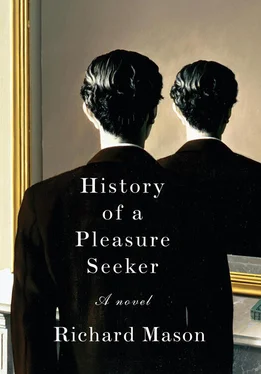Jay’s pride did not permit self-pity. He kept his loneliness in quarantine, confined in a vault reinforced by unsentimental discipline. He was able to ignore its existence for months at a time, but tonight he felt it seeping from its confinement. He went out onto the promenade deck. It had rained during dinner and the teak boards were slippery. Now the air was exotic with the scents of the tropics. The moon was a night off its fullness and sent an orange summons across the waves towards him. It was absurd to spend such a night without a lover. He escaped its beauty and went indoors, but the band’s merry music made him sadder.
Jay Gruneberger’s business associates admired his capacity to engineer a situation to his satisfaction. The foundations of this ability were intelligence and persistence. He had felt certain he could speak to the fellow at least and ascertain from this encounter whether more might be hoped for. Now he abruptly lost the energy to mount another useless search. He went instead to the salon and ordered a cocktail. They would either meet or they would not. He left it in the lap of the gods.
Piet left the chorus girls’ dressing room smitten. He was not depressed by his failure to achieve a more instant union with Stacey Meadows. Delay could only heighten their coming together and he admired her strictness wholeheartedly. As he walked down the corridor he felt euphoric. A year before he had been a junior clerk in Leiden, obliged to sleep in a musty alcove and shit in an outhouse. Now the most powerful men in the world took him for one of their own. He thought sympathetically of Didier and wondered whether he should find him at once and make things all right. He decided against it. His friend would feel patronized by immediate sympathy. He would look for him tomorrow and laugh their awkwardness away.
Piet had a great gift for experiencing the present. It seemed a waste to burden it now with thoughts of the future or the past. He had the run of the world’s finest ship and the clothes and manners to enjoy this glittering world undetected. Who knew when such a situation might arise again? He resolved to drink the cup of pleasure deep and hurried on.
The grand staircase was crowded. He had not had dinner and was pleasantly light-headed with hunger. He sauntered down the stairs, thinking of food, and looked into the smoking room where sandwiches of rare roast beef could be obtained at any hour. But the fug of a hundred postprandial cigars made his head spin. He left by a door in its west wall and found himself in a broad passage he had never been in before. The marble here was not painted. It was cut in vast slabs and covered floor, walls, and ceiling: a frothy cream jagged with shots of blue. At its summit was a gilt elevator and a menu stand embossed with the words GRILL ROOM.
He pressed the button firmly.
With an elegant whirring the cage came down — lined floor, walls and ceiling in marble. It did not seem that the chains that pulled it could support such weight, but the presence of a respectful attendant prohibited a display of nerves.
“You’ll want to hurry, sir. Last orders are in fifteen minutes.”
Piet stepped onto the platform and the doors slid shut. The lift began to rise. Up and up they went, through three decks, then four: each was crowded with people. It stopped on the fourth and a gay group joined him, the ladies in magnificent jewels. He was aware of their approving notice, and when one dropped her fan he retrieved it and was prettily thanked. The doors opened onto a vestibule painted like an afternoon sky, the rays of a gilt sun pointing towards the grill room’s entrance. The party with him were greeted rapturously and led to their table.
“May I have your cabin number, sir?” Maurice Moureaux held his pen above the register. “There is a supplementary charge for the grill room. It will be added to your bill.”
Over his last six transatlantic voyages, Maurice Moureaux had formed an understanding of some convenience with a plongeur in the first-class kitchens, a cocky Marseilleise of no education but great wit, with an immense prick. The purser disapproved of shipboard liaisons and had transferred Jean-Anton to the Joséphine two days before the Eugénie ’s departure, leaving Maurice with no erotic companion. He was fastidious. Since encountering Piet Barol in the reading room’s service corridor he had found no one to his taste. To be able to ascertain his cabin number struck him as a piece of great good fortune. He repeated his question.
“My cabin number?”
“Or the name of your suite.” Moureaux smiled his glossy smile and stood as tall as he could; he worried about being short.
For an instant Piet faltered, confronted by the decision between retreat and advance. He decided to advance. “The Henri de Navarre.”
“And your name, sir?”
“Van Sigelen. Frederik van Sigelen.”
“Come this way, Mr. van Sigelen. Will you be dining alone?”
Piet nodded.
“What a pleasure to see you again.” Moureaux took a leather-bound menu and led him to a table by the window. In the long oval mirrors an orange moon glowed. The ceiling was glazed; Piet had never seen such stars. It was the most expensive room on the oceans, a private concession run by César Ritz. Only dishes that had been served to the kings at Versailles were offered here, and the amounts beside them were among the largest he had ever seen in print.
Moureaux unfolded his napkin and placed it on his lap. There was a dance floor at the far end of the room, surrounded on three sides by waves and stars. “I shall send the sommelier at once, sir.”
A flutter of subsiding adrenaline made Piet shiver. He had dared and won — again! He felt triumphantly alive. Moureaux bowed and retreated; but moments later, as Piet weighed the merits of quail and turbot, the steward returned.
“I’m sorry, Mr. van Sigelen. The register has Mr. and Mrs. Rossiter in the Henri de Navarre Suite.”
“Did I say Navarre? I meant Marie Antoinette.”
“Of course.” Moureaux hoped that the handsome young passenger had made this error to ensure that they spoke again. He asked Piet whether he had explored the ship to his full satisfaction.
“She’s a glorious machine.”
“I should be happy, at any moment, to show you over her.”
“I’ll remember that.”
The band began to play the Waltz of the Flowers. It was a piece of music that summoned for Moureaux the glory of his youth in St. Petersburg, when he had been the most admired waiter at its composer’s favorite restaurant. As the clarinet swirled, he was again twenty-two and incontrovertibly desirable. He bowed and returned to the register. When Piet stood and followed him his heart beat faster.
It was clear to Piet Barol that he should not be present for much further examination of the passenger list. “I’ve left my cigarettes in my cabin,” he said nonchalantly. “I’ll just go and get them.”
“Permit me to have a packet sent to your table immediately. Which brand may I obtain for you?”
“I have them hand-rolled in England. I’ll get them myself.”
It was possible to deduce a great deal about a person’s inclinations from the contents of his wardrobes. Moureaux was glad to have this opportunity to conduct a discreet examination. “Allow me to fetch them for you.”
“They’re in a locked case. I’ll go.”
The gaiety of the music inspired daring. “I could accompany you, if you wish.”
“That’s not necessary.”
“Very well, sir. The kitchen will be closing shortly. I shall ask the chef to wait for you. May I take your order?”
“The turbot.”
“Thank you.”
Piet went to the elevator and pressed the button.
Moureaux began to prepare his bill and to wonder how he might contrive to bring him breakfast in bed one morning. He felt dreamy and romantic and could not find the name van Sigelen anywhere on the passenger manifest. He scanned the lists of suites. Catherine de Médicis. Henri de Navarre. Joan of Arc. Louis XIV. Marie Antoinette. By this entry were the words: Schermerhorn, Mrs. Cornelius. Coffee should be iced after Malta .
Читать дальше












